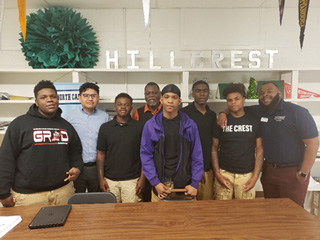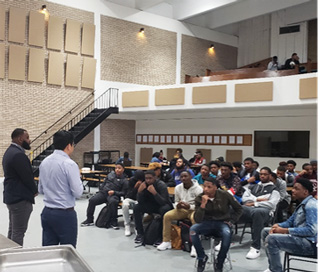Mens Huddle prepares high school males for college life and beyond
Miriam Webster’s Dictionary offers three definitions for the noun “huddle” – a close-packed group; meeting or conference; and a brief gathering of football players assembled to receive instructions from a quarterback. These same definitions are the very essence of Men’s Huddle, a newly formed peer mentoring group for high school juniors and seniors.

Men’s Huddle mentors David Aquilar-Vazquez (second from left), Ron Claxton (fourth from left) and Samuel Hennings (at right) meet with Hillcrest High School students for a session on leadership.
The Huddle is exclusive to male high school juniors and seniors. Male recruiters from Southwest meet with students from designated Shelby County Schools (SCS) to offer instruction on how to succeed in life and pursue a college education. You could say they act as the students’ quarterbacks, challenging them to reach their goals, whether it’s overcoming a personal life situation or completing a college application.
“We definitely are a close, tightknit group in the sense that we serve the purpose of meeting with these students in a more involved way than through the typical recruitment process,” Southwest Recruiter and Men’s Huddle Mentor Samuel Hennings said. “We intentionally want to build a relationship with the students and meet them where they are—both in life and on-site at their school.”
Vice President of Student Affairs Jacqueline Faulkner envisioned the Men’s Huddle. She saw the importance of reaching out into the community to marginalized students as fulfilling the mission of Southwest as a community college and as a pipeline to help students enter college. “Throughout the country, there has been a stark decline in the number of men participating and completing college,” said Faulkner. “At Southwest, despite experiencing a growth in overall enrollment, the male-to-female ratio has continued to widen over the past few years. We want young men in our community to know that a college degree is attainable and to have clear direction on how to make it possible!”
Having strong examples of male achievement, such as the faculty, staff, and administrators who are involved in this initiative, and access to positive male mentors, are essential to increasing the college attendance rates for males in Shelby and Fayette County, Faulkner said. “We believe that early awareness and grassroots efforts to take the resources to students while still in high school will help them see a path to a college degree,” Faulkner added. “If they can see it, then they can believe it. If they can believe it, then they can achieve it!”
The Huddle began monthly mentoring meetings at Kirby, Hillcrest and Memphis Academy of Health Sciences (MAHS) high schools this past March as a pilot study. The schools were chosen due to their at-risk student populations and requests by counselors who were looking for collegiate male role models.
“When we visit SCS high schools throughout the year, counselors often tell us they need men outside of their school to be positive role models for their young adult males — someone they can look up to,” Associate Director of K-12 and Community Partnerships Shawn Boyd said.
Huddle counselors addressed more than 150 students collectively at Kirby and MAHS and six juniors at Hillcrest.
Associate Director of Academic Support Ron Claxton says he always believed in planting the seed of “college” in students at an early age—even as young as elementary school. “Today, students need positive role models early on,” Claxton said. “When we go into a high school, we don’t go in claiming to be perfect people. We talk about our imperfections and that we, too, once struggled at their age, yet persevered to get where we are.” Claxton says this is how the mentors meet them where they are — they are not there to judge but to lend support, advice, counsel and instruction. “We tell them it’s ok to struggle.”
In addition to attending sessions with the mentors, students have the opportunity to meet with representatives from student development, financial aid, and academic affairs.

Hennings and Aquilar-Vazquez offer advice on the college admissions process to students at the Memphis Academy of Health Sciences High School.
Recruiter Hennings said there are specific topics the mentors tackle with the students. “We begin with leadership as a concept because we want them to know they are leaders no matter what circumstances they come from,” he said. “We talk about study habits and every day skills, but not without infusing critical thinking processes. And if they have other topics they want to cover, that’s ok by us, too.”
Co-mentor and Southwest Recruiter David Aquilar-Vazquez said some of the sessions incorporate academic subjects into solving daily obstacles. “For instance, we may work with someone who has a hard time with public speaking and while coaching that person on public speaking, we will cover vocabulary and grammar lessons.” Aquilar-Vazquez said the students are very engaged, often proposing topics of their own to discuss. “We actually came up with a list of values for these young men to follow—what we call our deliverables—that are basic tenets on how to carry oneself and move forward in life, especially given the backgrounds they come from,” Aquilar-Vazquez said. “Examples of these principles include believing in something higher than oneself, working hard, choosing positive friends, and valuing one’s culture and history.”
Boyd said that, though these principles are geared toward young African-American males, the Huddle meetings are open to any male who has expressed an interest in the mentorship program. “By far, the male students we see are African-American because of the locality of their schools or neighborhoods,” said Boyd. “They are also an underrepresented population in college and we want to close that gap.”
The Office of Student Development will stay in communication with the students they mentor throughout the summer so they know they are not forgotten. The staff has planned touchpoints to keep them engaged, including campus tours, field trips, panel discussions, workshops, extended mentorships with Southwest Ambassadors, and more.
“We’ll be able to introduce them to Southwest and for the seniors involved, track them to see if they enroll for the Fall semester,” Boyd said. “If they have, we’ll know we’ve been successful and will expand the program to other schools.”
In This Issue...
- From President Tracy D. Hall
- Adjuncts saluted at awards dinner
- FROM THE EDITOR-IN-CHIEF
- AACC appoints President Hall to economic and workforce development commission
- Men’s Huddle prepares high school males for college life and beyond
- International Studies seeks faculty, staff advisors to choose Spring 2020 trips
- Welcome aboard, new team members
- Freshman Josue Flores finds a home in America at Southwest
- Summer Institute explores ways to close student achievement gaps
- EMPLOYEE OF THE MONTH: Business and Technologies Secretary Karen Taylor
- New Student Orientation takes show on the road with NSO on the Go
- Macon Cove Campus ambulance simulator adds real life feel to EMT training
- HR CORNER: Tennessee adopts new worker’s compensation injury claim reporting guidelines
- Quality center trains ER chief/brigadier general in Lean Six Sigma
- SALUQI CORNER
- Ordering paper just got easier
- State announces incentive program to encourage timely reporting of automobile accidents
- CULINARY CORNER WITH CHEF STEVEN LEAKE
- Fuel for Finals reboots for Spring Semester
- Southwest: In the News